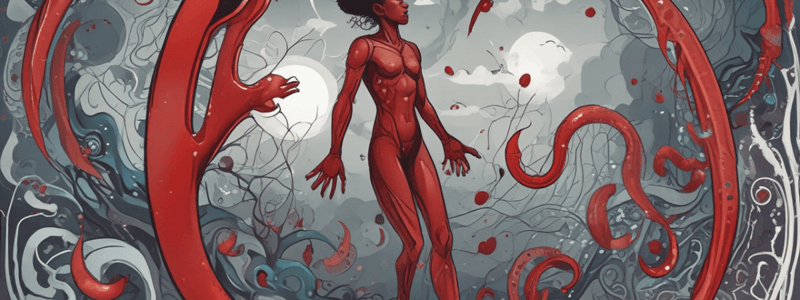Podcast
Questions and Answers
What is the main function of hemoglobin in the body?
What is the main function of hemoglobin in the body?
- To fight off infections
- To carry oxygen to the body's tissues (correct)
- To regulate body temperature
- To produce energy for the body
What is the genetic disorder that affects the production of hemoglobin?
What is the genetic disorder that affects the production of hemoglobin?
- Sickle cell trait
- Sickle cell anemia (correct)
- Thalassemia
- Anemia
What is the result of HbS causing red blood cells to become misshapen and rigid?
What is the result of HbS causing red blood cells to become misshapen and rigid?
- Yellowing of the skin and eyes
- Increased risk of infections
- Anemia (correct)
- Painful episodes
What is a common symptom of sickle cell anemia?
What is a common symptom of sickle cell anemia?
What is a complication of sickle cell anemia?
What is a complication of sickle cell anemia?
What is a type of test used to diagnose sickle cell anemia?
What is a type of test used to diagnose sickle cell anemia?
What is a treatment for sickle cell anemia?
What is a treatment for sickle cell anemia?
What is the inheritance pattern of sickle cell anemia?
What is the inheritance pattern of sickle cell anemia?
What is the risk of a child inheriting sickle cell anemia if both parents are carriers?
What is the risk of a child inheriting sickle cell anemia if both parents are carriers?
What is the term for a person who carries the mutated gene but does not have the condition?
What is the term for a person who carries the mutated gene but does not have the condition?
Flashcards are hidden until you start studying
Study Notes
Definition and Causes
- Sickle cell anemia is a genetic disorder that affects the production of hemoglobin, a protein in red blood cells that carries oxygen to the body's tissues.
- It is caused by a mutation in the HBB gene that codes for hemoglobin subunit beta, leading to the production of abnormal hemoglobin (HbS).
- HbS causes red blood cells to become misshapen, rigid, and prone to premature breakdown, resulting in anemia.
Symptoms
- Anemia (low red blood cell count)
- Fatigue
- Shortness of breath
- Dizziness
- Pale skin
- Cold hands and feet
- Yellowing of the skin and eyes (jaundice)
- Painful episodes (sickle cell crisis)
Complications
- Increased risk of infections (e.g., pneumonia, meningitis)
- Organ damage (e.g., kidneys, liver, spleen)
- Stroke and other neurological complications
- Blindness and vision problems
- Delayed growth and development in children
- Increased risk of death in infancy and early childhood
Diagnosis
- Newborn screening tests
- Hemoglobin electrophoresis
- Genetic testing (e.g., DNA analysis)
Treatment and Management
- Blood transfusions
- Pain management (e.g., medication, physical therapy)
- Antibiotics (to prevent infections)
- Vaccinations (e.g., pneumococcal, meningococcal)
- Folic acid supplements
- Bone marrow transplantation (in severe cases)
- Hydroxyurea therapy (to reduce sickling and anemia)
Inheritance and Genetics
- Autosomal recessive inheritance pattern
- Carriers of the HbS mutation (sickle cell trait) are usually asymptomatic but can pass the mutation to offspring
- Offspring of two carriers have a 25% chance of inheriting the mutation and developing sickle cell anemia
Definition and Causes
- Sickle cell anemia is a genetic disorder that affects hemoglobin production in red blood cells.
- It is caused by a mutation in the HBB gene, leading to the production of abnormal hemoglobin (HbS).
- HbS causes red blood cells to become misshapen, rigid, and prone to premature breakdown, resulting in anemia.
Symptoms
- Anemia leads to fatigue, shortness of breath, and dizziness.
- Misshapen red blood cells cause pale skin and cold hands and feet.
- Jaundice occurs due to the breakdown of red blood cells.
- Painful episodes, known as sickle cell crisis, occur due to the blockage of blood vessels.
Complications
- Infections, such as pneumonia and meningitis, are a result of a weakened immune system.
- Organ damage occurs in the kidneys, liver, and spleen due to blocked blood vessels.
- Stroke and other neurological complications can occur due to blocked blood vessels in the brain.
- Blindness and vision problems occur due to blocked blood vessels in the eyes.
- Delayed growth and development occur in children due to inadequate oxygen supply.
- Infants and young children are at an increased risk of death.
Diagnosis
- Newborn screening tests detect hemoglobin abnormalities.
- Hemoglobin electrophoresis confirms the presence of HbS.
- Genetic testing, such as DNA analysis, identifies carriers of the HbS mutation.
Treatment and Management
- Blood transfusions increase red blood cell count and oxygen supply.
- Pain management involves medication and physical therapy.
- Antibiotics prevent bacterial infections.
- Vaccinations, such as pneumococcal and meningococcal, prevent infections.
- Folic acid supplements promote red blood cell production.
- Bone marrow transplantation is a treatment option for severe cases.
- Hydroxyurea therapy reduces sickling and anemia.
Inheritance and Genetics
- Sickle cell anemia has an autosomal recessive inheritance pattern.
- Carriers of the HbS mutation, known as sickle cell trait, are usually asymptomatic.
- Offspring of two carriers have a 25% chance of inheriting the mutation and developing sickle cell anemia.
Studying That Suits You
Use AI to generate personalized quizzes and flashcards to suit your learning preferences.




